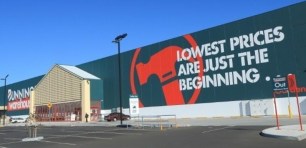
Wesfarmers, the country’s largest retail group, quietly relaunched its membership program OnePass mid-year, bringing together Kmart, Target and its marketplace Catch under one subscription umbrella.
At the moment, the offer is simple. Some might say it’s modest: for $4 per month, subscribers receive free shipping on purchases from the stores mentioned above (as well as other benefits such as shopping exclusives and fast online checkout). But the strategy — and the investment behind it — is significant. OnePass is part of the company’s OneDigital program, into which Wesfarmers has just invested $100 million. In June it appointed Kellie Cordner (ex-Carsales) to the new role of OnePass chief customer officer.
Given that subscriptions are on the rise across so many industries, and the huge recent increase in online shopping, you can easily mount the case that OnePass is needed — perhaps even essential. But if it’s to succeed it has to be much more than an online fulfilment service.
Paid loyalty programs like OnePass are not new in retail. They’re common, in fact, but that doesn’t mean they’re infallible. Australia Post’s Shipster is a cautionary tale from not that long ago. It was an attempt to implement a free shipping subscription covering multiple retailers and had to close down after just 18 months. One of the reasons for that was because it couldn’t get the merchant adoption it needed, in many cases because retailers were already working on or offering their own subscription schemes.
Another reason why subscriptions such as this fail is because they’re little more than a data-mining exercise. Customers expect genuine value from their subscriptions and won’t tolerate being spammed with low-value offers.
In other words, it’s a solid strategy, but success is not a fait accompli. Why will Wesfarmers be confident that it can make it work where others haven’t quite got it right?
Well, for a start, it is not approaching this model as novices. As I’ve said, subscriptions have been around in retail for a long while, and Wesfarmers has offered such services, for years (Bunnings’ PowerPass, aimed at small business tradespeople, is one example).
Costco and Amazon are pioneers in the domain, and have enjoyed great success with paid loyalty subscriptions, not just in the US but around the world.
OnePass is very much fashioned in their image because, to a great extent, it’s an attempt to compete with them.
In Australia, Woolworths and Coles (previously owned by Wesfarmers) have both offered subscription services for grocery deliveries for some time and both had significant customer adoption during the worst of the pandemic.
But increased competition and COVID-19 restrictions haven’t been the only catalysts for this shift towards subscriptions. Rising costs — for energy and transport, for example — combined with decreasing basket sizes have led to retailer margins being squeezed. Subscriptions are being used as a new form of loyalty program, providing genuine benefits to customers (not substandard deals or absurdly restricted points programs), while locking in predictable revenue for businesses.
Wesfarmers can also be confident because well-structured programs fighting against the dominance of Amazon Prime have worked exceptionally well elsewhere. In the US, for instance, Walmart Plus launched in September of 2020. For US$98 per year, subscribers receive free delivery for orders over a certain amount, as well as quite significant fuel discounts. Within nine months it had attracted 54 million subscribers and it has held on to them, as well.
It’s a fine balancing act. Retail shoppers want free shipping and discounts. We know that from a recent Zuora study which placed both of these services (or add-ons) in the top five offered by strong retail businesses. But customers are smart; they’ve now had years and years to observe the difference between a tacky membership scheme and a thoughtfully implemented subscription program. Between actual value and flashy marketing promises.
Wesfarmers also has another major advantage: scale. It owns a significant number of Australia’s most popular retail companies, not just Kmart, Target and Catch, but Bunnings, Officeworks and Priceline. What an ace up the sleeve if and when OnePass expands.
At the moment, though, the program is in its infancy. And it is a sensible first step in recognising the need to change the business model.
It’s an exciting period for the company as it seeks to grow its share of wallets and create deeper engagement. But the proof, ultimately, will be in its long-term subscriber numbers.
Handpicked for you

Bunnings axes the catalogue, but has the hardware titan made a huge mistake?



COMMENTS
SmartCompany is committed to hosting lively discussions. Help us keep the conversation useful, interesting and welcoming. We aim to publish comments quickly in the interest of promoting robust conversation, but we’re a small team and we deploy filters to protect against legal risk. Occasionally your comment may be held up while it is being reviewed, but we’re working as fast as we can to keep the conversation rolling.
The SmartCompany comment section is members-only content. Please subscribe to leave a comment.
The SmartCompany comment section is members-only content. Please login to leave a comment.